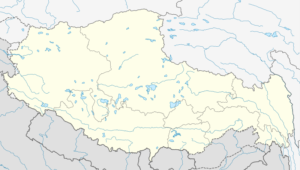
Location map China Tibet is located in Tibet
When China brutally attacked Tibet, drove out the protesting Tibetans and forcefully occupied the country a few decades back, many Tibetans expected that the USA would intervene and liberate Tibet sooner or later. The Tibetans had such expectations since the USA has been claiming that it stands for freedom and liberty and would support the cause of democracy.
However, even the optimists developed doubts about the commitment of USA towards the cause of Tibet’s independence when the former US President Obama received the Dalai Lama through the back door in White House, as he was anxious not to offend China and chose to ignore China’s misdeeds in Tibet.
When Trump won the election and became the President of USA, hopes were rekindled amongst the Tibetans that Trump administration would take a tough stand against China on number of issues, since one of the significant political rhetorics of Trump during his election campaign centred around strong observations against China for its various acts of omission and commission. As a matter of fact, immediately after assuming office, he spoke to the Taiwanese President over the telephone, which act was thought by many persons as a signal to China as to how Trump would deal with it.
All such expectations have vanished after the recent visit of Trump to China.
Many observers around the world have been of the view that the claims of US government about fighting for the cause of liberty and freedom was not genuine and priority of US in shaping relation with all countries only relates to trade and business interests. The statue of liberty in Washington seems to be only one more statue in the USA, and it appears that it has no significance for the US government.
Earlier, when Chinese President Xi Jinping and his wife visited the USA, President Trump never raised any issue about human rights violation in China, and it’s unjustified claim on Tibetan territory.
The recent visit of President Trump to China makes it amply clear that the USA looks at China only as a trade and business partner and the US has no concern about China’s forced occupation of Tibet suppressing the freedom for Tibetans.
During the visit, the focus of the discussions was only on trade and business interests. Commercial deals of over 253 billion USD was signed between USA and China. It is reported that amongst Trump’s family members, his daughter and son in law have strong business ties with China.
In such scenario, can Tibetans expect that US government would be concerned about Tibetan cause?
Tibetans need to work out some strategies and action plans to keep the torch of their freedom struggle alive.
China’s continued occupation of Tibet and the silence of the world community about China’s aggression in Tibet have boosted the confidence of China that it can take the world reaction for granted for all its steps of economic and political aggression anywhere.
There is considerable apprehension in countries in south-east Asia and far east about China’s territorial ambitions, and it’s aggressive game plans. Japan, Vietnam, Philippines are amongst the countries which are viewing China’s various claims on their territory with apprehension, and they realize that they would be paying too big a price if they would allow China to have its way.
These countries are sure to understand the plight that Tibet had to undergo in the hands of China. Tibetans should take some steps to spread awareness about their plight in these countries and seek the support of the governments. This could be a starting point for the next stage of struggle for the Tibetan freedom.
